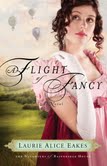Regency writers and readers are some of the most persnickety lovers of any genre. On fan lists, I have seen people complain about a book for everything from the hero wearing trousers in 1800, to a boxing match that took place six months after the book’s setting. It’s enough to give writers in the genre heart palpitations.
I think about this as I await the final page proofs on A Flight of Fancy, my next Regency.
What errors did I make and who will find them and what will they say to me or others? Will it stop them from enjoying the book so much they’ll say bad things about it? Angst. Angst. Angst.
The problem is that the Regency is such a specific genre. The time period is brief, even when we stretch it from the true nine-year period, to the thirty year time publishing allows in many cases.

The Regency is location specific. Having a Regency take place outside of the British Isles isn’t impossible if one has mainly British characters (which can include Scottish, Welsh, and Irish), and those characters must act, speak, and think like a Regency era person. In other words, the priorities in life are: Family, Country, God. Hmm. More problems when adding the inspirational element to the genre.
In short, the Regency novel must sound, smell, taste, look, and, above all, feel like early nineteenth century Britain. If you could change titles to mister and missus, or exchange a location in England for one in America, the novel might not be true Regency novel.
Or is it? Do readers really know that much or care?
Yes, writing a Regency novel does not require a great deal of knowledge of the time and place; it requires the ability to withstand the angst of knowing one made some flaw and whether or not it will it be fatal.
Laurie Alice Eakes
Originally posted 2012-04-25 02:54:08.

Comments are closed.